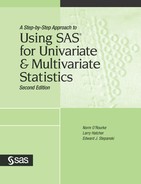Coefficient Alpha
Formula
Coefficient alpha is a general formula for scale reliability based on internal consistency. It provides the lowest estimate of reliability that can be expected for an instrument.
The formula for coefficient alpha is as follows:

where
| αxx | = | Coefficient alpha |
| N | = | Number of items constituting the instrument |
| S2 | = | Variance of the summated scale scores (e.g., assume that you compute a total score for each participant by summing responses to the items that constitute the scale; the variance of this total score variable would be S2) |
| ∑S2i | = | The sum of the variances of the individual items that constitute this scale |
When Will Coefficient Alpha Be High?
Other factors held constant, coefficient alpha will be high to the extent that many items are included in the scale, and the items that constitute the scale are highly correlated with one another.
To understand why a coefficient alpha is high when the items are highly correlated with one another, consider the second term in the preceding formula:

This term shows that the variance of the summated scales scores is (essentially) divided by itself to compute coefficient alpha. However, the combined variance of the individual items is first subtracted from this variance before division is performed. This part of the equation shows that, if combined variance of the individual items is a small value, then coefficient alpha will be a relatively larger value.
This is important because (with other factors held constant), the stronger the correlations between the individual items, the smaller the ∑S2i term. This is why coefficient alpha for responses to a given scale is likely to be large to the extent that the variables constituting that scale are strongly correlated.
